International Trade Law: C.I.F Contracts and Bills of Lading Analysis
VerifiedAdded on 2023/06/15
|7
|1927
|397
Case Study
AI Summary
This case study delves into various aspects of maritime law, primarily focusing on Cost, Insurance, and Freight (C.I.F.) contracts and bills of lading within the context of international trade. It addresses scenarios involving breach of contract, damaged goods, and the rights and responsibilities of buyers ...
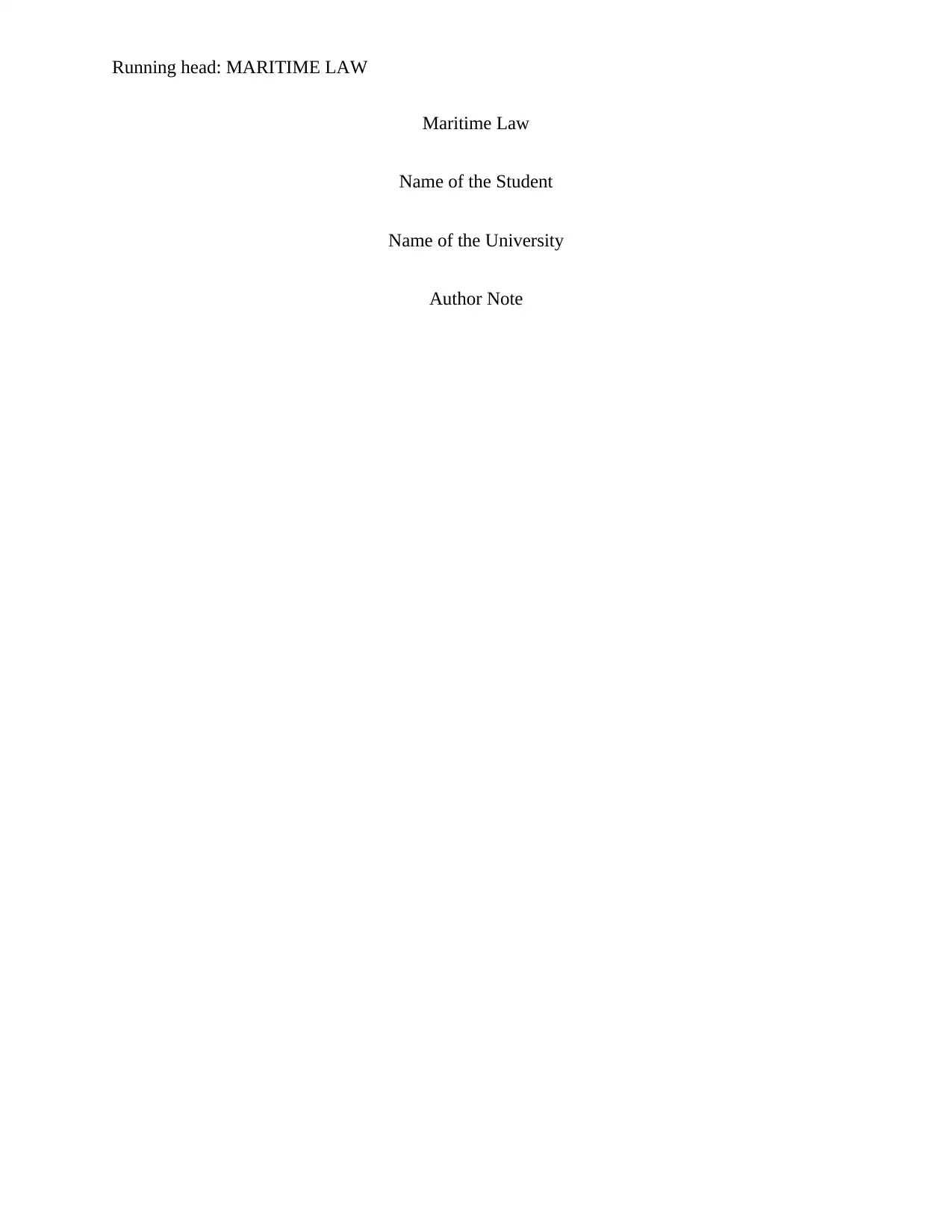
Running head: MARITIME LAW
Maritime Law
Name of the Student
Name of the University
Author Note
Maritime Law
Name of the Student
Name of the University
Author Note
Paraphrase This Document
Need a fresh take? Get an instant paraphrase of this document with our AI Paraphraser
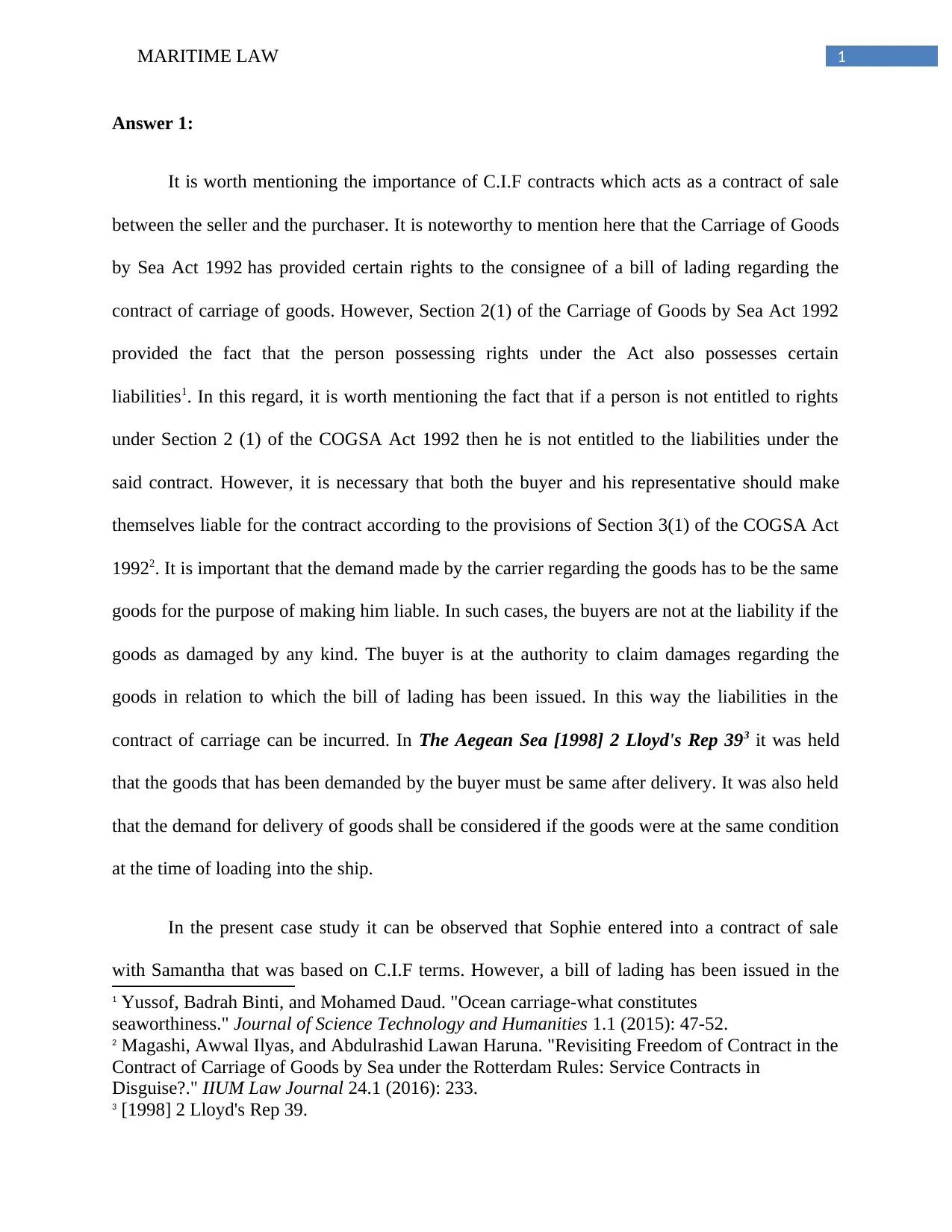
1MARITIME LAW
Answer 1:
It is worth mentioning the importance of C.I.F contracts which acts as a contract of sale
between the seller and the purchaser. It is noteworthy to mention here that the Carriage of Goods
by Sea Act 1992 has provided certain rights to the consignee of a bill of lading regarding the
contract of carriage of goods. However, Section 2(1) of the Carriage of Goods by Sea Act 1992
provided the fact that the person possessing rights under the Act also possesses certain
liabilities1. In this regard, it is worth mentioning the fact that if a person is not entitled to rights
under Section 2 (1) of the COGSA Act 1992 then he is not entitled to the liabilities under the
said contract. However, it is necessary that both the buyer and his representative should make
themselves liable for the contract according to the provisions of Section 3(1) of the COGSA Act
19922. It is important that the demand made by the carrier regarding the goods has to be the same
goods for the purpose of making him liable. In such cases, the buyers are not at the liability if the
goods as damaged by any kind. The buyer is at the authority to claim damages regarding the
goods in relation to which the bill of lading has been issued. In this way the liabilities in the
contract of carriage can be incurred. In The Aegean Sea [1998] 2 Lloyd's Rep 393 it was held
that the goods that has been demanded by the buyer must be same after delivery. It was also held
that the demand for delivery of goods shall be considered if the goods were at the same condition
at the time of loading into the ship.
In the present case study it can be observed that Sophie entered into a contract of sale
with Samantha that was based on C.I.F terms. However, a bill of lading has been issued in the
1 Yussof, Badrah Binti, and Mohamed Daud. "Ocean carriage-what constitutes
seaworthiness." Journal of Science Technology and Humanities 1.1 (2015): 47-52.
2 Magashi, Awwal Ilyas, and Abdulrashid Lawan Haruna. "Revisiting Freedom of Contract in the
Contract of Carriage of Goods by Sea under the Rotterdam Rules: Service Contracts in
Disguise?." IIUM Law Journal 24.1 (2016): 233.
3 [1998] 2 Lloyd's Rep 39.
Answer 1:
It is worth mentioning the importance of C.I.F contracts which acts as a contract of sale
between the seller and the purchaser. It is noteworthy to mention here that the Carriage of Goods
by Sea Act 1992 has provided certain rights to the consignee of a bill of lading regarding the
contract of carriage of goods. However, Section 2(1) of the Carriage of Goods by Sea Act 1992
provided the fact that the person possessing rights under the Act also possesses certain
liabilities1. In this regard, it is worth mentioning the fact that if a person is not entitled to rights
under Section 2 (1) of the COGSA Act 1992 then he is not entitled to the liabilities under the
said contract. However, it is necessary that both the buyer and his representative should make
themselves liable for the contract according to the provisions of Section 3(1) of the COGSA Act
19922. It is important that the demand made by the carrier regarding the goods has to be the same
goods for the purpose of making him liable. In such cases, the buyers are not at the liability if the
goods as damaged by any kind. The buyer is at the authority to claim damages regarding the
goods in relation to which the bill of lading has been issued. In this way the liabilities in the
contract of carriage can be incurred. In The Aegean Sea [1998] 2 Lloyd's Rep 393 it was held
that the goods that has been demanded by the buyer must be same after delivery. It was also held
that the demand for delivery of goods shall be considered if the goods were at the same condition
at the time of loading into the ship.
In the present case study it can be observed that Sophie entered into a contract of sale
with Samantha that was based on C.I.F terms. However, a bill of lading has been issued in the
1 Yussof, Badrah Binti, and Mohamed Daud. "Ocean carriage-what constitutes
seaworthiness." Journal of Science Technology and Humanities 1.1 (2015): 47-52.
2 Magashi, Awwal Ilyas, and Abdulrashid Lawan Haruna. "Revisiting Freedom of Contract in the
Contract of Carriage of Goods by Sea under the Rotterdam Rules: Service Contracts in
Disguise?." IIUM Law Journal 24.1 (2016): 233.
3 [1998] 2 Lloyd's Rep 39.
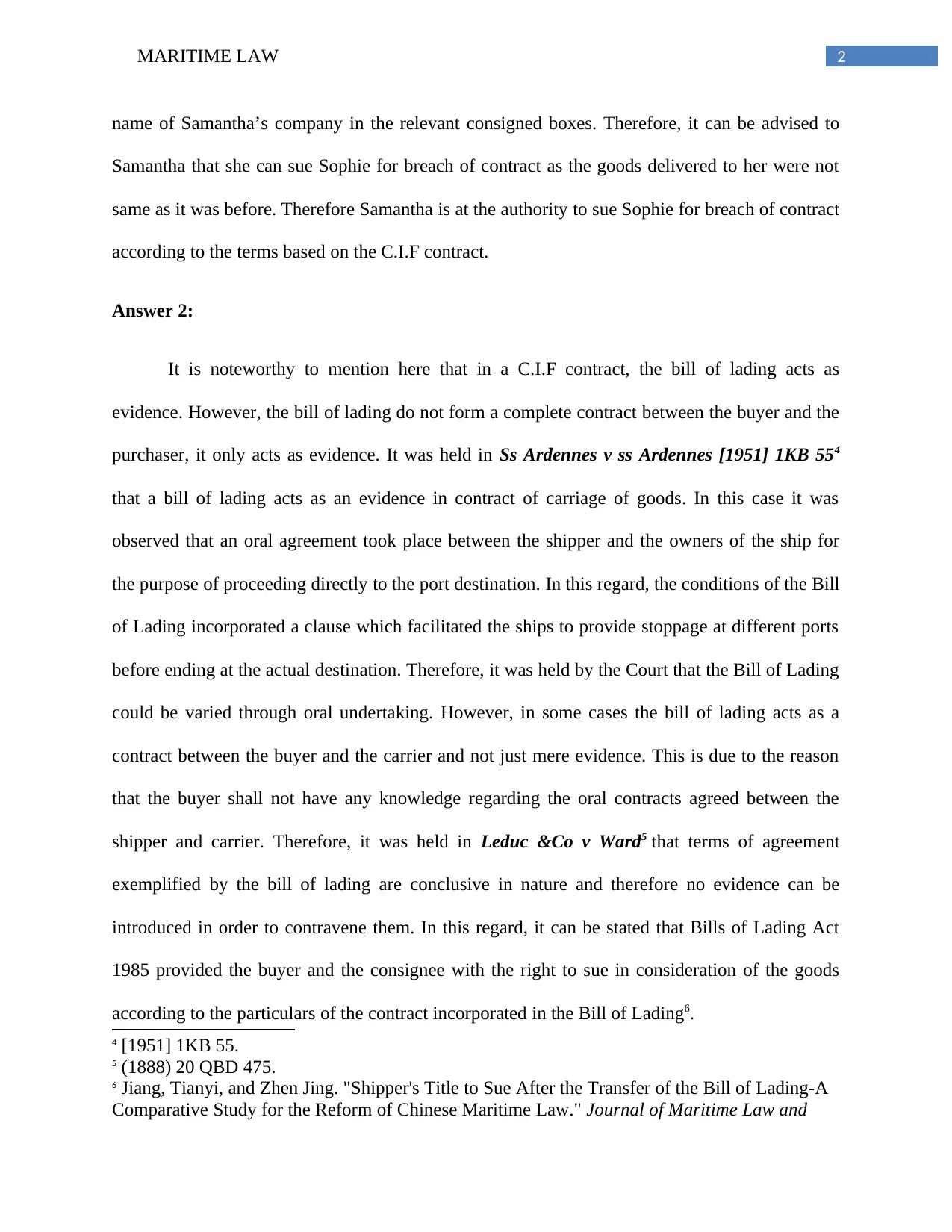
2MARITIME LAW
name of Samantha’s company in the relevant consigned boxes. Therefore, it can be advised to
Samantha that she can sue Sophie for breach of contract as the goods delivered to her were not
same as it was before. Therefore Samantha is at the authority to sue Sophie for breach of contract
according to the terms based on the C.I.F contract.
Answer 2:
It is noteworthy to mention here that in a C.I.F contract, the bill of lading acts as
evidence. However, the bill of lading do not form a complete contract between the buyer and the
purchaser, it only acts as evidence. It was held in Ss Ardennes v ss Ardennes [1951] 1KB 554
that a bill of lading acts as an evidence in contract of carriage of goods. In this case it was
observed that an oral agreement took place between the shipper and the owners of the ship for
the purpose of proceeding directly to the port destination. In this regard, the conditions of the Bill
of Lading incorporated a clause which facilitated the ships to provide stoppage at different ports
before ending at the actual destination. Therefore, it was held by the Court that the Bill of Lading
could be varied through oral undertaking. However, in some cases the bill of lading acts as a
contract between the buyer and the carrier and not just mere evidence. This is due to the reason
that the buyer shall not have any knowledge regarding the oral contracts agreed between the
shipper and carrier. Therefore, it was held in Leduc &Co v Ward5 that terms of agreement
exemplified by the bill of lading are conclusive in nature and therefore no evidence can be
introduced in order to contravene them. In this regard, it can be stated that Bills of Lading Act
1985 provided the buyer and the consignee with the right to sue in consideration of the goods
according to the particulars of the contract incorporated in the Bill of Lading6.
4 [1951] 1KB 55.
5 (1888) 20 QBD 475.
6 Jiang, Tianyi, and Zhen Jing. "Shipper's Title to Sue After the Transfer of the Bill of Lading-A
Comparative Study for the Reform of Chinese Maritime Law." Journal of Maritime Law and
name of Samantha’s company in the relevant consigned boxes. Therefore, it can be advised to
Samantha that she can sue Sophie for breach of contract as the goods delivered to her were not
same as it was before. Therefore Samantha is at the authority to sue Sophie for breach of contract
according to the terms based on the C.I.F contract.
Answer 2:
It is noteworthy to mention here that in a C.I.F contract, the bill of lading acts as
evidence. However, the bill of lading do not form a complete contract between the buyer and the
purchaser, it only acts as evidence. It was held in Ss Ardennes v ss Ardennes [1951] 1KB 554
that a bill of lading acts as an evidence in contract of carriage of goods. In this case it was
observed that an oral agreement took place between the shipper and the owners of the ship for
the purpose of proceeding directly to the port destination. In this regard, the conditions of the Bill
of Lading incorporated a clause which facilitated the ships to provide stoppage at different ports
before ending at the actual destination. Therefore, it was held by the Court that the Bill of Lading
could be varied through oral undertaking. However, in some cases the bill of lading acts as a
contract between the buyer and the carrier and not just mere evidence. This is due to the reason
that the buyer shall not have any knowledge regarding the oral contracts agreed between the
shipper and carrier. Therefore, it was held in Leduc &Co v Ward5 that terms of agreement
exemplified by the bill of lading are conclusive in nature and therefore no evidence can be
introduced in order to contravene them. In this regard, it can be stated that Bills of Lading Act
1985 provided the buyer and the consignee with the right to sue in consideration of the goods
according to the particulars of the contract incorporated in the Bill of Lading6.
4 [1951] 1KB 55.
5 (1888) 20 QBD 475.
6 Jiang, Tianyi, and Zhen Jing. "Shipper's Title to Sue After the Transfer of the Bill of Lading-A
Comparative Study for the Reform of Chinese Maritime Law." Journal of Maritime Law and
⊘ This is a preview!⊘
Do you want full access?
Subscribe today to unlock all pages.

Trusted by 1+ million students worldwide
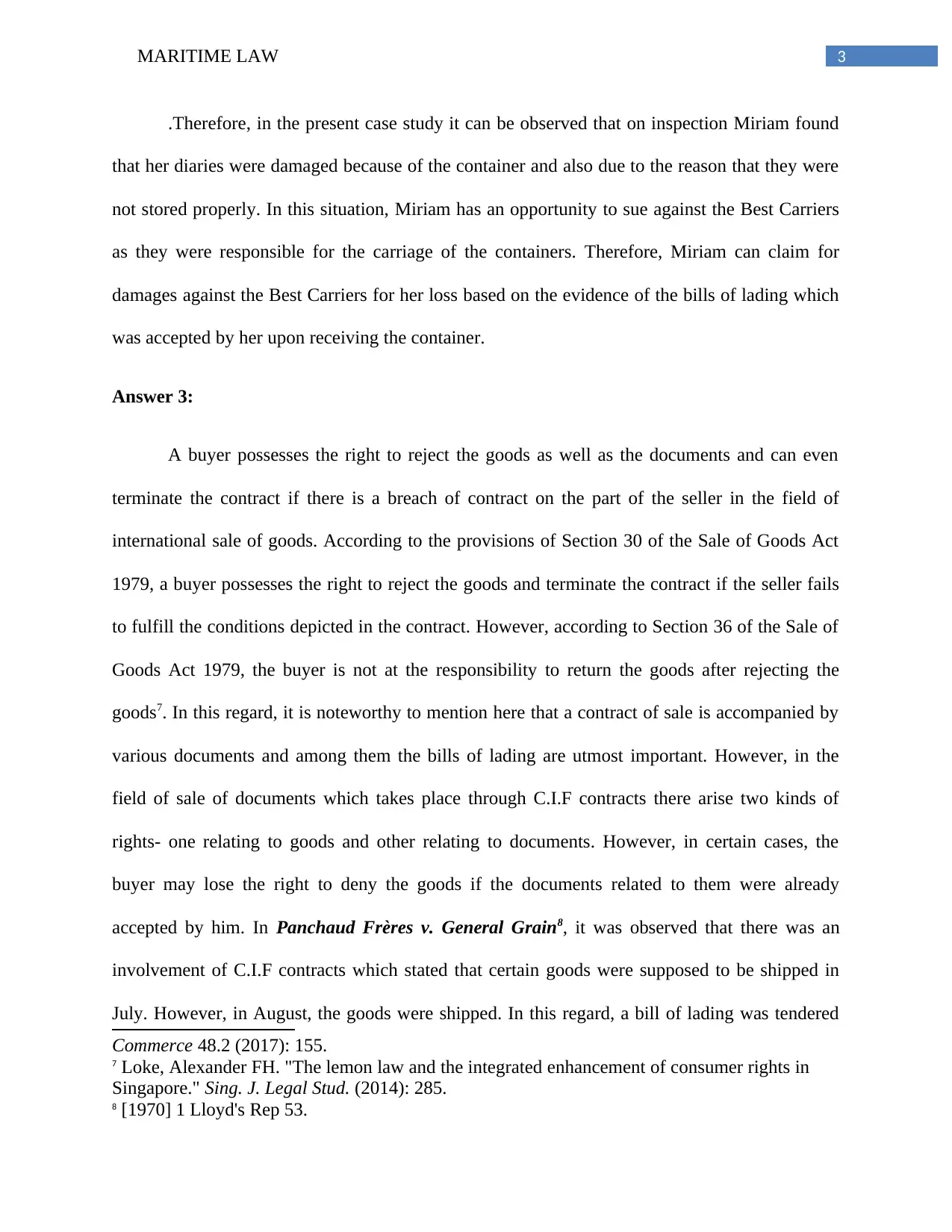
3MARITIME LAW
.Therefore, in the present case study it can be observed that on inspection Miriam found
that her diaries were damaged because of the container and also due to the reason that they were
not stored properly. In this situation, Miriam has an opportunity to sue against the Best Carriers
as they were responsible for the carriage of the containers. Therefore, Miriam can claim for
damages against the Best Carriers for her loss based on the evidence of the bills of lading which
was accepted by her upon receiving the container.
Answer 3:
A buyer possesses the right to reject the goods as well as the documents and can even
terminate the contract if there is a breach of contract on the part of the seller in the field of
international sale of goods. According to the provisions of Section 30 of the Sale of Goods Act
1979, a buyer possesses the right to reject the goods and terminate the contract if the seller fails
to fulfill the conditions depicted in the contract. However, according to Section 36 of the Sale of
Goods Act 1979, the buyer is not at the responsibility to return the goods after rejecting the
goods7. In this regard, it is noteworthy to mention here that a contract of sale is accompanied by
various documents and among them the bills of lading are utmost important. However, in the
field of sale of documents which takes place through C.I.F contracts there arise two kinds of
rights- one relating to goods and other relating to documents. However, in certain cases, the
buyer may lose the right to deny the goods if the documents related to them were already
accepted by him. In Panchaud Frères v. General Grain8, it was observed that there was an
involvement of C.I.F contracts which stated that certain goods were supposed to be shipped in
July. However, in August, the goods were shipped. In this regard, a bill of lading was tendered
Commerce 48.2 (2017): 155.
7 Loke, Alexander FH. "The lemon law and the integrated enhancement of consumer rights in
Singapore." Sing. J. Legal Stud. (2014): 285.
8 [1970] 1 Lloyd's Rep 53.
.Therefore, in the present case study it can be observed that on inspection Miriam found
that her diaries were damaged because of the container and also due to the reason that they were
not stored properly. In this situation, Miriam has an opportunity to sue against the Best Carriers
as they were responsible for the carriage of the containers. Therefore, Miriam can claim for
damages against the Best Carriers for her loss based on the evidence of the bills of lading which
was accepted by her upon receiving the container.
Answer 3:
A buyer possesses the right to reject the goods as well as the documents and can even
terminate the contract if there is a breach of contract on the part of the seller in the field of
international sale of goods. According to the provisions of Section 30 of the Sale of Goods Act
1979, a buyer possesses the right to reject the goods and terminate the contract if the seller fails
to fulfill the conditions depicted in the contract. However, according to Section 36 of the Sale of
Goods Act 1979, the buyer is not at the responsibility to return the goods after rejecting the
goods7. In this regard, it is noteworthy to mention here that a contract of sale is accompanied by
various documents and among them the bills of lading are utmost important. However, in the
field of sale of documents which takes place through C.I.F contracts there arise two kinds of
rights- one relating to goods and other relating to documents. However, in certain cases, the
buyer may lose the right to deny the goods if the documents related to them were already
accepted by him. In Panchaud Frères v. General Grain8, it was observed that there was an
involvement of C.I.F contracts which stated that certain goods were supposed to be shipped in
July. However, in August, the goods were shipped. In this regard, a bill of lading was tendered
Commerce 48.2 (2017): 155.
7 Loke, Alexander FH. "The lemon law and the integrated enhancement of consumer rights in
Singapore." Sing. J. Legal Stud. (2014): 285.
8 [1970] 1 Lloyd's Rep 53.
Paraphrase This Document
Need a fresh take? Get an instant paraphrase of this document with our AI Paraphraser
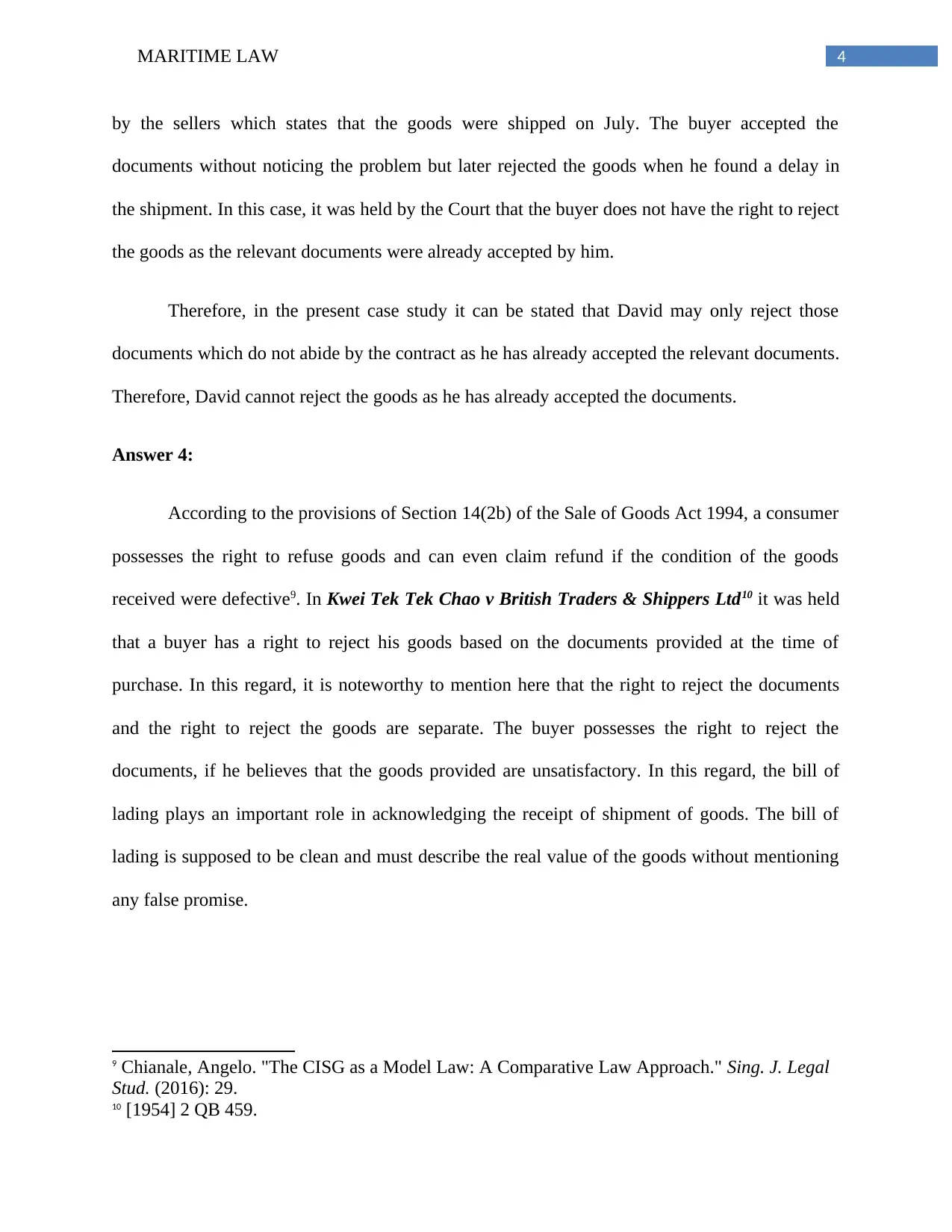
4MARITIME LAW
by the sellers which states that the goods were shipped on July. The buyer accepted the
documents without noticing the problem but later rejected the goods when he found a delay in
the shipment. In this case, it was held by the Court that the buyer does not have the right to reject
the goods as the relevant documents were already accepted by him.
Therefore, in the present case study it can be stated that David may only reject those
documents which do not abide by the contract as he has already accepted the relevant documents.
Therefore, David cannot reject the goods as he has already accepted the documents.
Answer 4:
According to the provisions of Section 14(2b) of the Sale of Goods Act 1994, a consumer
possesses the right to refuse goods and can even claim refund if the condition of the goods
received were defective9. In Kwei Tek Tek Chao v British Traders & Shippers Ltd10 it was held
that a buyer has a right to reject his goods based on the documents provided at the time of
purchase. In this regard, it is noteworthy to mention here that the right to reject the documents
and the right to reject the goods are separate. The buyer possesses the right to reject the
documents, if he believes that the goods provided are unsatisfactory. In this regard, the bill of
lading plays an important role in acknowledging the receipt of shipment of goods. The bill of
lading is supposed to be clean and must describe the real value of the goods without mentioning
any false promise.
9 Chianale, Angelo. "The CISG as a Model Law: A Comparative Law Approach." Sing. J. Legal
Stud. (2016): 29.
10 [1954] 2 QB 459.
by the sellers which states that the goods were shipped on July. The buyer accepted the
documents without noticing the problem but later rejected the goods when he found a delay in
the shipment. In this case, it was held by the Court that the buyer does not have the right to reject
the goods as the relevant documents were already accepted by him.
Therefore, in the present case study it can be stated that David may only reject those
documents which do not abide by the contract as he has already accepted the relevant documents.
Therefore, David cannot reject the goods as he has already accepted the documents.
Answer 4:
According to the provisions of Section 14(2b) of the Sale of Goods Act 1994, a consumer
possesses the right to refuse goods and can even claim refund if the condition of the goods
received were defective9. In Kwei Tek Tek Chao v British Traders & Shippers Ltd10 it was held
that a buyer has a right to reject his goods based on the documents provided at the time of
purchase. In this regard, it is noteworthy to mention here that the right to reject the documents
and the right to reject the goods are separate. The buyer possesses the right to reject the
documents, if he believes that the goods provided are unsatisfactory. In this regard, the bill of
lading plays an important role in acknowledging the receipt of shipment of goods. The bill of
lading is supposed to be clean and must describe the real value of the goods without mentioning
any false promise.
9 Chianale, Angelo. "The CISG as a Model Law: A Comparative Law Approach." Sing. J. Legal
Stud. (2016): 29.
10 [1954] 2 QB 459.

5MARITIME LAW
Therefore in the present case study, it can be stated that if Samantha had an idea that the
diaries provided to her were wrong then she acquired the right to reject the relevant documents
presented to her by Sophie at the time of purchase.
Therefore in the present case study, it can be stated that if Samantha had an idea that the
diaries provided to her were wrong then she acquired the right to reject the relevant documents
presented to her by Sophie at the time of purchase.
⊘ This is a preview!⊘
Do you want full access?
Subscribe today to unlock all pages.

Trusted by 1+ million students worldwide
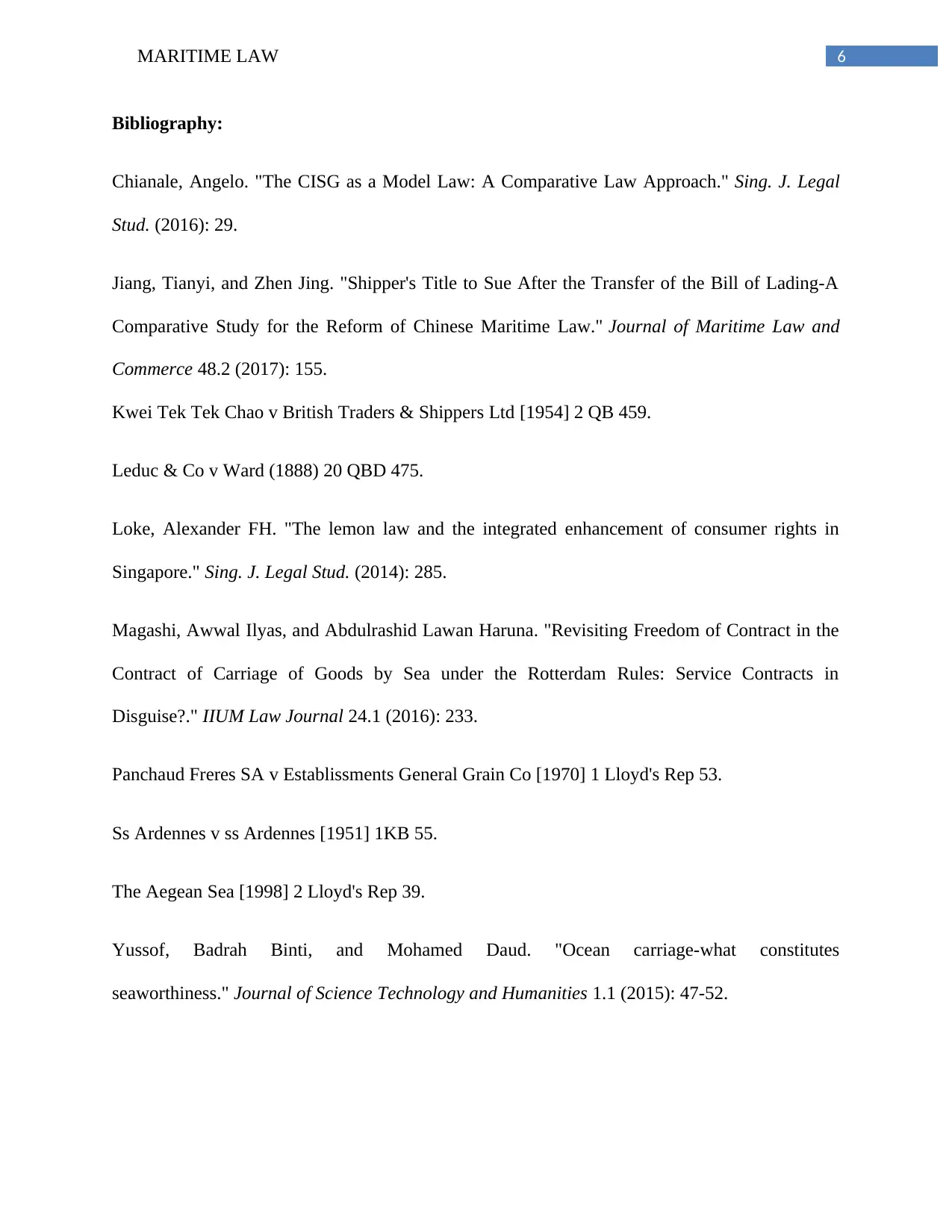
6MARITIME LAW
Bibliography:
Chianale, Angelo. "The CISG as a Model Law: A Comparative Law Approach." Sing. J. Legal
Stud. (2016): 29.
Jiang, Tianyi, and Zhen Jing. "Shipper's Title to Sue After the Transfer of the Bill of Lading-A
Comparative Study for the Reform of Chinese Maritime Law." Journal of Maritime Law and
Commerce 48.2 (2017): 155.
Kwei Tek Tek Chao v British Traders & Shippers Ltd [1954] 2 QB 459.
Leduc & Co v Ward (1888) 20 QBD 475.
Loke, Alexander FH. "The lemon law and the integrated enhancement of consumer rights in
Singapore." Sing. J. Legal Stud. (2014): 285.
Magashi, Awwal Ilyas, and Abdulrashid Lawan Haruna. "Revisiting Freedom of Contract in the
Contract of Carriage of Goods by Sea under the Rotterdam Rules: Service Contracts in
Disguise?." IIUM Law Journal 24.1 (2016): 233.
Panchaud Freres SA v Establissments General Grain Co [1970] 1 Lloyd's Rep 53.
Ss Ardennes v ss Ardennes [1951] 1KB 55.
The Aegean Sea [1998] 2 Lloyd's Rep 39.
Yussof, Badrah Binti, and Mohamed Daud. "Ocean carriage-what constitutes
seaworthiness." Journal of Science Technology and Humanities 1.1 (2015): 47-52.
Bibliography:
Chianale, Angelo. "The CISG as a Model Law: A Comparative Law Approach." Sing. J. Legal
Stud. (2016): 29.
Jiang, Tianyi, and Zhen Jing. "Shipper's Title to Sue After the Transfer of the Bill of Lading-A
Comparative Study for the Reform of Chinese Maritime Law." Journal of Maritime Law and
Commerce 48.2 (2017): 155.
Kwei Tek Tek Chao v British Traders & Shippers Ltd [1954] 2 QB 459.
Leduc & Co v Ward (1888) 20 QBD 475.
Loke, Alexander FH. "The lemon law and the integrated enhancement of consumer rights in
Singapore." Sing. J. Legal Stud. (2014): 285.
Magashi, Awwal Ilyas, and Abdulrashid Lawan Haruna. "Revisiting Freedom of Contract in the
Contract of Carriage of Goods by Sea under the Rotterdam Rules: Service Contracts in
Disguise?." IIUM Law Journal 24.1 (2016): 233.
Panchaud Freres SA v Establissments General Grain Co [1970] 1 Lloyd's Rep 53.
Ss Ardennes v ss Ardennes [1951] 1KB 55.
The Aegean Sea [1998] 2 Lloyd's Rep 39.
Yussof, Badrah Binti, and Mohamed Daud. "Ocean carriage-what constitutes
seaworthiness." Journal of Science Technology and Humanities 1.1 (2015): 47-52.
1 out of 7
Related Documents
Your All-in-One AI-Powered Toolkit for Academic Success.
+13062052269
info@desklib.com
Available 24*7 on WhatsApp / Email
![[object Object]](/_next/static/media/star-bottom.7253800d.svg)
Unlock your academic potential
© 2024 | Zucol Services PVT LTD | All rights reserved.




